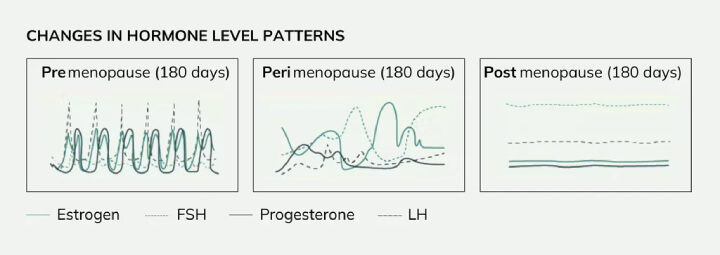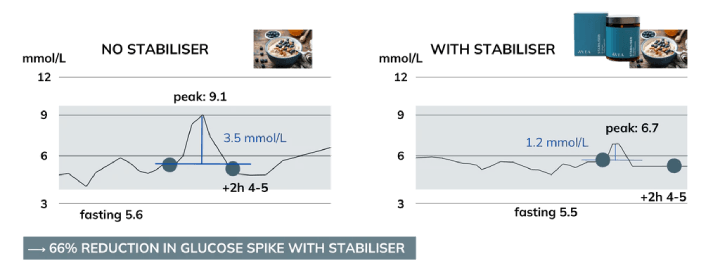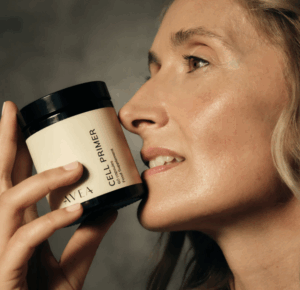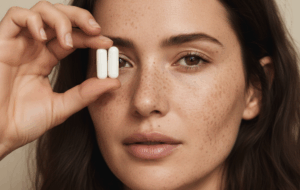What if we told you that good nutrition has the ability to positively influence your natural hormonal change and bring in positive health outcomes?
Biological ageing is the most important risk factor for all diseases. During menopause and postmenopause, hormone imbalances can further accelerate ageing, resulting in unpleasant symptoms and a declining health.
Luckily, lifestyle and dietary adjustments have been shown to be effective in improving the quality of life of menopausal and postmenopausal women.
Discover how your eating habits and food choices can enrich your menopause and the years after. At Avea, we want every woman to feel fully empowered in their body.
In this article
Free guide to reverse your biological age

- Master the science of rejuvenation.
- Apply proven tips to turn back the clock.
- Transform your health with top longevity specialists.
Menopause Facts
- Women experience menopause on average at the age of 51-52, but about 1% of women become menopausal when they are under 40.
- The mean duration of menopausal symptoms is 7.4 years, including 4.5 years after the menopause.
- Approximately 2/3 of peri-menopausal women develop symptoms related to their menopausal transition.
First things first, what is menopause?
The term “menopause” refers to the last menstrual period in a woman’s life, without removal of the uterus and without taking hormones. It is a transient phase of female fertility.

How does menopause occur?
The decisive factor is the diminishing amount of the follicles in the ovary. When these are used up, the ovarian production of oestrogen and progesterone stops.
This causes a shift in the hormonal balance between the sex hormones (oestrogen and progesterone) and the ovarian command hormones (corpus luteum and follicle-stimulating hormone (FSH)).
The phase of life before and shortly after the last bleeding is called “perimenopause“. This is when significant irregularities in the menstrual cycle occur until menstruation stops completely.
The hormone concentration ratio changes dramatically, which can result in symptoms such as hot flushes, sleep disturbances, joint pain, dryness of the mucous membranes and pain during sexual intercourse.
Other complaints, such as anxiety, irritability and depression, palpitations, skin dryness and blemishes, fatigue, irritability as well as metabolic fluctuations are also common.
It is only 12 months after the last bleeding that it can be assumed that this was really the last bleeding, making menopause quite difficult to detect.
After these 12 months, i.e. 1 year after the last bleeding, ‘’postmenopause’’ begins. The hormone levels settle down to a stable level. The end of the menopause has thus been reached.

How do we bridge the gap to nutrition?
Interestingly enough, smoking, diabetes and other chronic diseases can induce the start of menopause almost two years in advance. Lifestyle, especially a balanced diet with a low glycemic index and a steady blood sugar balance, are crucial when it comes to minimising pre-, peri-, and postmenopausal symptoms and diseases.
Nutrition and postmenopausal diseases
Between the age of 50 – 59, the risks of cardiovascular diseases in women, as well as breast and abdominal cancer, increase sharply. Besides, it becomes easier to gain weight as muscle mass decreases.
Being overweight or underweight can also increase the risk of cancer. In addition, there is the risk of osteoporosis due to the lack of oestrogen. Hormonal changes also increase the risk of dementia in women.
Many women’s health complaints are being treated with hormone replacement therapies. Lifestyle, however, can already make a big difference. And it starts with one of the basic pillars of good health; nutrition.

Postmenopausal health problems can be addressed through a balanced diet and adequate essential nutrients and food choices, good sleep hygiene and enough physical activity
How can a diet help with menopause symptoms
- It always makes sense to make easy-to-digest food choices during these years.
- Eat more frequent and small meals, avoid large portions.
- Develop a regular eating pattern to prevent cravings, excessive fullness, mood swings etc.
- Manage your blood sugar.
The Avea Stabiliser consists of a unique combination of 3 natural ingredients; Reducose, Berberine and Chromium Picolinate.
Our science-based formula helps to control blood sugar, thus also partially curbing hot flushes by slowing and blocking the absorption of carbohydrates and sugars during eating.
The undigested carbs end up as prebiotics, further strengthening gut and brain health that may become less stable during the post-menopause.
The Avea Stabiliser also increases insulin sensitivity, which helps maintain a healthy weight, establish healthy fat metabolism, which in turn supports vascular health.

- Go for vegetable-based diets – at least 3 servings. Vegetables (filling, rich in micronutrients, phytochemicals, antioxidants, magnesium, calcium)
- Favour whole-grain products (depending on digestibility), which support blood sugar regulation through complex carbohydrates.
- Opt for diets rich in minerals (especially calcium); e.g. oatmeal with banana, yoghourt, kefir, low-fat curd cheese
- Enrich your diet with phytoestrogens such as flax seeds, soybeans, berries, tofu, garlic, peaches, dried fruits, cruciferous vegetables, bran etc. – they can develop a have mild oestrogen-like effects
- Use hot spices moderately: Replace with mild spices & herbs.
- “What is good for the heart is also good for the brain”. – Choose vegetable fats, fish, eat colourful veggies and fruits, and keep an eye on your vitamin D and B12 levels (sunshine and an egg helps here). Also, dietary supplements can be helpful to bridge the nutritional gap.
Beverage choices can also help manage menopausal symptoms:
- Alcohol and coffee can exacerbate hot flushes and should only be consumed in small amounts. So, consume only 1-2 cups of coffee max per day.
- Herbal teas are recommended: peppermint tea refreshes hot flashes from the inside.
- Drinking warm water regularly helps with cold attacks.
Key Takeaway
Menopause occurs due to a lack of estrogen and an altered hormonal balance that may cause women in their prime to struggle with physical ailments as well as metabolic turbulence. Hormone deficiency in post-menopausal women also accelerates various ageing processes.
A balanced anti-inflammatory diet can greatly improve the quality of life as well as the health span during and after the menopause.
Healthy fats, a stable and balanced carbohydrate and fat metabolism and foods rich in minerals, fibre and phytoestrogens can help the body to cope with hormone-related fluctuations.
The Stabiliser is a perfect addition to an optimised menopausal diet to optimise and balance metabolism and reduce post-menopausal disease risk.
The results are clear:
- fewer cravings
- lower fasting blood sugar
- better body composition
- more balanced hormones
- clearer skin
- better sleep
- more energy.
Hands up, girls! Because who runs the world?








